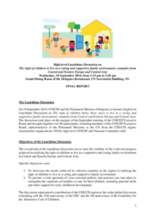Displaying 561 - 570 of 911
This research brief provides an overview of an impact evaluation of the “Happy Families Program,” conducted by the International Rescue Committee (IRC). The Happy Families Program is a parenting and family skills intervention designed for Burmese families living on the Thai-Burmese border.
This article draws on Promundo and RWAMREC’s programmatic experiences in Rwanda of implementing MenCare+, a gender transformative approach to engaging young and adult men (ages 15–35) in caregiving, maternal, newborn, and child health, and sexual and reproductive health and rights.
This review aims at gaining a better understanding of the landscape of, and support efforts by, the Early Childhood Development and Violence Prevention communities through identifying networks, campaigns, movements, and initiatives
This article assesses the evidence-based programs that are most likely to improve key health and well-being outcomes for teenage mothers in the United States and yields a list that reflects the best evidence for efficacy and effectiveness.
Baptcare, OzChild and Anchor - three organizations that provide kinship care services in Victoria, Australia - commissioned this research to explore the impact that complexity in care arrangements has on children and families in kinship care.
This presentation from IRC, given at the State of the Evidence on Children’s Care Symposium, outlines the findings of recent research on parenting interventions in low-resource settings.
This study involved the use of qualitative methods as part of a larger process evaluation to explore the longer-term experiences of parents who participated in a randomized controlled trial (RCT) of the Incredible Years Parenting Programme (IYPP) in disadvantaged settings in Ireland.
This animated video, made by Dr. Mike Evans, founder of the Health Design Lab at the Li Ka Shing Knowledge Institute, illustrates the impacts of trauma and negative experiences on young children’s brain development and the ways in which healthy cognitive development can be promoted.
On 10 September 2014, UNICEF and the Permanent Mission of Bulgaria co-hosted a high level Lunchtime Discussion on The right of children below three years to live in a caring and supportive family environment: examples from Central and Eastern Europe and Central Asia.
This study tested whether the extent of delays in support seeking is associated with working alliance for parents with mild intellectual disabilities (MID) and whether the importance of working alliance may depend on parenting stress and availability of informal support.






